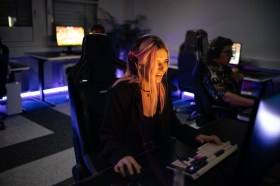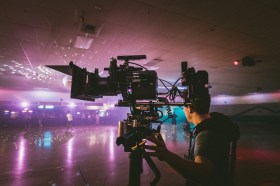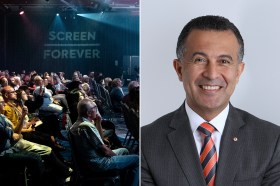Federal policy around the screen sector is caught in a triangular vice. The Government is determined to see every decision through the lens of an election battle, the internet has trashed the traditional entertainment sectors, and COVID-19 has ruined our life as a social species.
There is a bitter cage fight between the Coalition and Labor about the power of the major media owners to affect the results of elections, but you won’t find any more than the occasional squeak about that in the official policies.
The Liberal Party
Dan Tehan, the Minister for Trade, Tourism and Investment, told the industry’s Screen Forever Conference at the end of March this year that ‘our Government invested a record $530 million in the screen sector in the 2020-21 financial year, including providing $175.1 million in rebates for 118 Australian productions through the Producer Offset.
‘We have also distributed more than $272 million under our $540 million Location Incentive to attract 28 international productions to Australia.’
The party has had no new significant announcements around the screen sector in this election campaign. In March, instead, Tehan reiterated the government’s flashy rescue announcements. He told the conference that the government had provided $50m to the Temporary Interruption Fund. The audience understood this is actually an insurance fund against closing productions during COVID.
The Government also provided an additional $30m to Screen Australia and $20m to the Australian Children’s Television Foundation to help the industry through changes to the sub-quota system, which started on 1 January 2021 in the teeth of independent screen-sector opposition.
Read: Paul Fletcher on ScreenHub: We don’t take the arts sector for granted
Underneath these temporary arrangements remains the stark fact that Screen Australia funding has dropped year by year, and that the ABC and SBS are bleeding as well. While the Coalition insists that it never did cut the ABC, the Parliament of Australia’s (APH) own analysis provided a damning and objective paragraph in reviewing the budget of 2018-19:
‘The Government anticipates that the pause in indexation of ABC funding “will result in savings to the Budget of $83.7 million over three years”. The indexation pause follows “efficiency savings” from the ABC (and Special Broadcasting Service (SBS)) in the 2014–15 budget of $35.5 and $8.0 million respectively. This was followed in November 2014 by much larger cuts of $254 million and $25 million respectively, aimed at ensuring “the ABC and SBS eliminate inefficiencies in their back office operations”.’
There are very clear signs – in all the Government’s focus on Brand Australia – that the screen sector will continue to be supported primarily as an export industry and focus strongly on globalised production, production for hire and the internationalisation of our own stories. The missing piece is domestic production, the creation of a strong local base, and our capacity to show ourselves to ourselves.
Here, the Government has significantly weakened domestic commercial television production by hollowing out the quota system and allowing the broadcasters to abandon children’s television.
At least the government was forced to withdraw its plan to revamp the Tax Offset program by reducing the film offset by 10% and evening the television figure up to the same 10%. After the kerfuffle, the sector came out with a 40:30 deal to the enormous relief of industry advocates.
Read: Industry wins on screen legislation – how it happened
The Labor Party
The Shadow Minister for Industrial Relations, Shadow Minister for the Arts and Manager of Opposition Business, Tony Burke is noticeably better at the empathetic language of lived experience … as well as pointing to the differences between the Labor and Liberal approaches. As he wrote on ScreenHub this week:
‘In 2013 I debated George Brandis at a Screen Producers Event and I raised my concern that it wouldn’t be too long before we were watching the internet through our TVs and we needed to find a way to support Australian content. George Brandis looked at me condescendingly – hard to believe I know – and said I clearly didn’t understand the issues.
‘We have now lost a decade where we don’t see enough Australian content streaming on our TVs and we don’t hear enough Australian music in our headphones. Even our authors have been hit by the changes with libraries moving to e-books. We need our settings updated for modern technology.
‘This is urgent. Australia must not be forever confined to someone else’s stories and someone else’s soundtrack.’
In practice, the ALP has offered some modest but concrete changes for the ABC. It wants to move from triennial to five-year funding regimes, to increase stability. The Party has reiterated its commitment to ‘reverse Scott Morrison’s cut of $83.7 million to the ABC’.
Read: Tony Burke on ScreenHub: A better future for the arts sector
This is the ‘pause in the indexation process’ that the APH noticed. Indexation is the automatic increase to account for inflation. Since then, inflation has doubled, so that increase itself will effectively be a cut, which will occur across the public service.
Why is this important? The ALP seeks to put itself on the side of the angels, but it is not talking about real increases, and they are trivial compared to the real losses.
In principle, according to the ALP: ‘It is essential to bolster the independence and stability of the national broadcasters as a guard against political interference in Australia’s democratic institutions […] In the face of political, social and economic instability at home and abroad, we must ensure that Australia’s instruments of nation building, democracy and culture remain strong now and into the future.’
This may sound like waffle but it draws a line between the combatants because the Liberal Party is not committed to the national broadcasters as institutions. When Morrison debates on commercial television after the evening game shows and refuses to go head to head with his opponents on the ABC, he makes his position pretty clear.
The ALP is also proposing a feasibility study into moving SBS from Artarmon to Western Sydney. It plans to review the anti-siphoning regulations to maintain sport on free to air television, and push the visibility of Australian shows on streaming and subscription providers. Both these ideas are supported by the traditional broadcasters via FreeTV, and raised the hackles of Foxtel.
It will back both community broadcasting and community TV to stay on air until there is what it calls ‘an alternative use for the radiofrequency spectrum’. The Community Broadcasting Foundation, the peak body for the sector, will get $12m/year from next year towards its $20m annual costs, much more than the Liberals have put in play.
Labor is also taking Australian broadcasting back into the Pacific. It proposes an Indo-Pacific Broadcasting Strategy, in which the ABC will get $8m/year for the next four years to ‘expand ABC regional transmission and content production’. PacificAus TV, by which FreeTV sources Australian Free to Air commercial programming to be fired around the region, remains in the deal.
The Greens
The Greens have assembled a basic list of 17 principles and 33 aims. To support the screen industries, the party is in lockstep with the ALP – at least as far as election-friendly statements go. High-quality content, proper funding, primary support for the ABC and SBS, genuinely independent boards, diverse community media, sport on FTA television are all fundamental.
But they want to remove advertising from SBS, which would provoke a cat fight.
The Greens bring out that hidden rage over media ownership and clandestine(ish) reactionary interference, with a whole section called ‘Media ownership, regulation and freedom of speech and expression.’ They believe in tough government, with an ‘independent media industry regulatory body with adequate funding and powers … competition laws to minimise future consolidation of media companies … break up the concentrated ownership of large media organisations … transparency and public accountability for the workings of the Australian Classification Board, the Office of Film and Literature Classification and the Australian Communications and Media Authority website blacklist.’
Read: Sarah Hanson-Young on ArtsHub: the arts matter to the Greens
Greens Senator Sarah Hansen-Young, responsible for the Environment and Biodiversity, Water and Murray-Darling Basin, Arts, Nuclear and Communications portfolios, talked of ‘stories’ while addressing a screen industry crowd at the Screen Forever Conference a couple of months ago – a word choice I found interesting.
‘I want to say first up that Australians thank you,’ Hanson-Young said. ‘We couldn’t have got through the last two years of COVID and this pandemic without the stories that you tell on our television screens and and our streaming services, our phones and our tablets every day.
‘And it is really because of the creativity of those who work in the arts that we managed to get through this last two years, both intact and insane and perhaps with a little more humility about our place in the world.’
She went on to deploy that well-worn word ‘story’ in a contemporary, culture-driven way. Stories are not commodities, or tools of collective self-delusion, or even just a magic carpet away from our daily whirl of woe. They are a form of reality.
‘Storytelling is such an important part of social change. And as a politician, that’s the business that I’m in. I’m working every day to on the issues and the policies that we face as a community and as a globe. Big issues like climate change the collapse of our environment, inequality, the representation of women, and the respect of women in our workplaces, in our homes and in our communities.
‘These are all issues that if we are to fix properly and to tackle fully we need to be able to harness the power of storytelling. And that is your business. That is what you do so well.’
Read: $1 billion Australian Stories Fund pledged by the Greens
Hansen-Young also announced the only truly substantial proposal for the screen sector which goes beyond dabbing antiseptic on the patches of gravel rash caused by the current government. The Greens have the freedom to be inspirational, and used it to create this: a $1 billion Australian Stories Fund.
Getting this to work will cause a territorial fight in the sector which will dwarf the considerations around the creation of Screen Australia in 2008. It certainly cuts across the screen sector’s own campaigns for a host of detailed changes focused on unenticing topics like terms of trade.
But it does have one advantage that goes far beyond any bids for votes. For the first time in living memory, the educational process is being hauled into the glare of scrutiny, while reform is defined in terms of youth and change.
The whole schemozzle
Once television moved from a limited, locally mediated smorgasbord of options to an endless tsunami of story-toys pouring in from across the world, the old rationale for regulating television was gone. The entire tool for social unification was broken.
Progressive bureaucrats from around the world are pushing to rescue some of the streaming, browser and applications revenue to fund local creation. The Liberals here are pushing for 5% and trying to reduce Foxtel’s commitment, the ALP has pushed the problem into the wider space of a national cutural policy, and the Greens are going for 20%, which the Europeans have already enshrined in law.
At the same time, the whole system is shuddering under the strain of increasing competition, as Netflix leads the way into shareholder crises, subscriptions stall, economies contract, streamers absorb traditional Hollywood resources etc etc etc. It is possible that the streaming companies are already lapsing into senility as they simply repeat themselves, paralysed by fear of failure, besieged by producers who know they only succeed by copying.
That whole notion of national culture, of diverse storytelling, of unique societies, could be disappearing into a kind of transnational glop until no-one comes from anywhere, and is heading for no more than an endless horizon of tower blocks invented in East Germany, refined in Hong Kong, tarted up in Phoenix and turned into death traps anywhere an inspector can be bribed.





